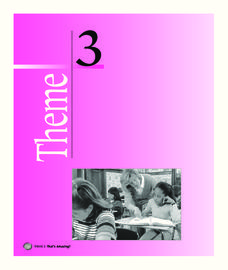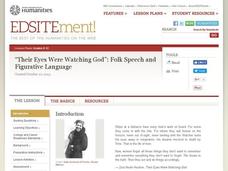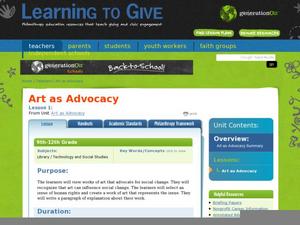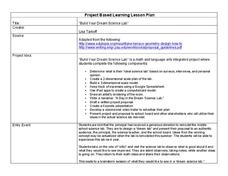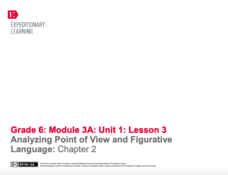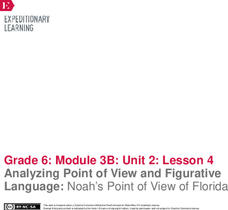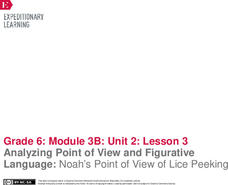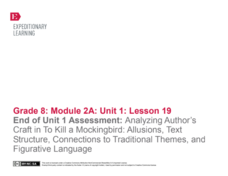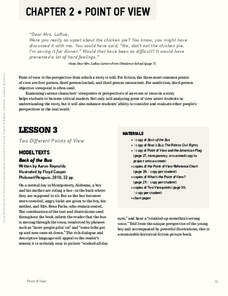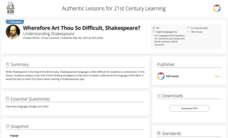Curated OER
Teaching Debate to ESL Students
Language learners use the debate format to practice formulating, expressing, and defending their ideas. Working in teams, class members develop resolutions, use opinion indicators to express their opinions and reasons, and prepare...
EngageNY
Summarizing Complex Ideas: Comparing the Original UDHR and the "Plain Language" Version
The eighth lesson plan in this series continues the focus on vocabulary and increasing young readers' awareness of academic language. Pairs of learners participate in a short vocabulary review activity called Interactive Words in which...
Houghton Mifflin Harcourt
Around Town: Neighborhood and Community: English Language Development Lessons (Theme 3)
Here is a unit designed to support English language development. Scholars speak, move, and write to learn more about topics that focus on community and local concepts. The series of lessons aids to reinforce concepts including consonant...
Houghton Mifflin Harcourt
Smart Solutions: English Language Development Lessons (Theme 6)
Smart Solutions is the theme of a unit created to meet the needs of English language earners. Through a series of lessons, scholars follow a routine—move, speak, and listen— to cover topics including stores, shops, celebrations, pets,...
Houghton Mifflin Harcourt
That’s Amazing!: English Language Development Lessons (Theme 3)
That's Amazing! is the theme of an English language development unit created by Houghton Mifflin. Following a speak, look, move, and listen routine, scholars delve into topics; seasons, weather, animals, landforms, telling time,...
University of Kansas
Newspaper in the Classroom
Newspapers aren't only for reading—they're for learning skills, too! A journalism unit provides three lessons each for primary, intermediate, and secondary grades. Lessons include objectives, materials, vocabulary, and procedure, and...
Curated OER
"Their Eyes Were Watching God": Folk Speech and Figurative Language
Using or considering using Zora Neale Hurston's Their Eyes Were Watching God? Then this packet is a must for your curriculum library. The examination of how Hurston combines folklore and folk language to create the voice of her...
Curated OER
Art as Advocacy for Social Change
“Humanscape No.65” by Melesia Casas and Ester Hernandez’s “Sun Maid Raisins” launch a study of how works of art can advocate for social change. After examining these two works and discussing the human rights issues raised, class members...
English Enhanced Scope and Sequence
Differentiate between Formal and Informal Language
The Pledge of Allegiance, the Gettysburg Address, the National Anthem, and the Preamble to the Constitution all get close attention in an exercise that asks learners to rewrite these formally-worded documents into informal language....
Santa Ana Unified School District
The Power of Point of View
Sometimes a whole story can change based on the perspective of the person telling it. Practice identifying and analyzing point of view in various reading passages and writing assignments with a language arts packet, complete with Common...
Curated OER
Build Your Dream Science Lab
Would your ideal science lab be filled with bubbling beakers and zapping Tesla coils? Or would it contain state-of-the-art computer technology and data analysis? Dream big with an innovative lesson that connects math and language arts...
Cleveland Metro School District
Novel Lesson for The Giver
Lois Lowry's The Giver is one of the most engaging and thought-provoking works of literature in the middle school curriculum. Round out your novel unit with a collection of reading activities, comprehension questions, memoir and journal...
EngageNY
Analyzing Point of View and Figurative Language: Chapter 2
Just get to the gist. Scholars work in pairs to find the gist of an excerpt from Laurence Yep's Dragonwings. Pupils also complete graphic organizers to analyze the text for tone, point of view, and figurative language.
EngageNY
Analyzing Point of View and Figurative Language: Noah’s Point of View of Florida
Fishing for words. Scholars search for unfamiliar words in pages 27-29 of Flush, place them in their word catchers, and complete part of Noah’s Point of View graphic organizer. After identifying figurative language, learners analyze tone...
EngageNY
Analyzing Point of View and Figurative Language: Noah’s Point of View of Lice Peeking
Read along with me. Two learners read the parts of Noah and Lice in Flush as the rest of the class follows along. Readers look for unfamiliar words and the use of figurative language in the text. They complete graphic organizers and...
EngageNY
End of Unit 1 Assessment: Analyzing Author’s Craft in To Kill a Mockingbird: Allusions, Text Structure, Connections to Traditional Themes, and Figurative Language
Scholars demonstrate their learning with an end-of-unit assessment. They work independently to discuss the Golden Rule and its relationship in To Kill a Mockingbird.
Curated OER
Object Pronouns
Work on replacing the object of a sentence with object pronouns. A handy grammar worksheet prompts language arts learners to read 20 sentences and choose the correct pronoun to fill in the blank from the word box above.
Houghton Mifflin Harcourt
One Land, Many Trails: English Language Development Lessons (Theme 5)
English is not the only subject that requires its own set of vocabulary words—geography does too! A series of language development lessons designed to be used with Theme 5: One Land, Many Trails helps introduce readers to key vocabulary...
Scholastic
Point of View
The point of view in a story can dramatically change the story itself. Focus on finding the points of view in various reading passages with a language arts packet, which includes fiction and nonfiction text.
K20 LEARN
Wherefore Art Thou So Difficult, Shakespeare? Understanding Shakespeare
'Tis not easy to understand the language of the Bard! But, hark! Fret not! With the assistance of this joyous activity, young players learn how to translate Shakespeare's English into modern language. Groups examine passages from Julius...
Teachers.net
Figurative Language
When is a staple remover a fanged monster? In your ELA classroom when you're teaching this fun figurative language lesson, of course! Get your young writers using figurative language by making a game of it. Give groups a paper bag full...
Odyssey of the Mind
Odyssey of the Mind Curriculum Activity: Performing Arts
The classical arts have made a lasting impact on our society and your advanced learners get to find out why. The activity starts as the children create a list of the arts found in society, they discuss how these art forms impact their...
EngageNY
Grade 9 ELA Module 2, Unit 2, Lesson 3
The manipulation of time is one of the most essential elements in Sophocles' Oedipus the King. As your language arts class participates in a jigsaw discussion activity, they work together to analyze the play's plot structure and...
Florida Center for Reading Research
Vocabulary: Morphemic Elements, Getting to the Root of It
Young readers learn how to get at the root of new vocabulary with this fun language arts activity. When working in pairs, children begin by matching unknown vocabulary words to their Greek or Latin roots. When all the vocabulary cards...
Other popular searches
- English Language Arts
- English Language Arts Exam
- English Language Arts Games
- Deaf English Language Arts
- English Language Arts Music
- English Language Arts Heroes
- English Language Arts Skills
- English Language Arts Grade 3
- English/language Arts
- English Language Arts Poetry
- English Language Arts Rating=3
- English Language Arts Unit Sc






